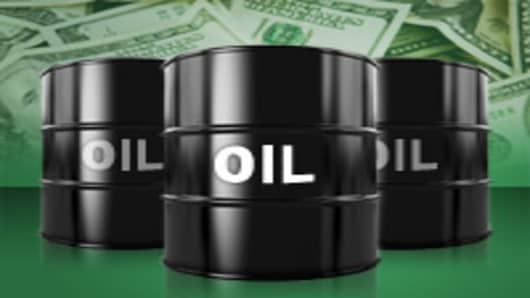OPEC could surprise the oil market and decide to change to its output targets at Wednesday's meeting. But comments from oil ministers gathering in Vienna indicate the group will likely stick with existing quotas.
As Saudi Oil Minister Ali Al-Naimi, the minister of the world's top oil producing nation, put it, "The market is in balance, the price is great, inventories are coming down so why should we do anything?" But later, he added that OPEC "will never allow" global oil markets to get too tight to pressure oil prices.
Some observers may have expected the latter comments to contribute to an oil price rally, but even as prices approach $82 a barrel, many traders say they are focused more on charts than OPEC members' chatter.
"Everything is short term now days. Performance has never been in more demand than it is now. And it's all one trade," says sales trader Gregory Glatt, managing director at Dominick & Dominick, a New York brokerage firm. "Right now the inflation trade is on. You see it in the dollar, you see it in gold, you see it in oil and energy. It's all one trade. There's never been a time things have been more interconnected."
And perhaps more disconnected from OPEC.
In recent months, price moves in most commodities, including oil, have been dictated by currencies, current money flows as well as optimism and concerns about China's demand growth and monetary policy. "OPEC is merely a data point," Glatt says.
With prices pivoting around $80 a barrel, the oil price is at a level that appears to be comfortable for both producers and consumers—even as more supply comes on the market. Oil prices have broken slightly above their recent range of $70 and $80 a barrel in the past week, since even as members' compliance with promised suppy cuts has dropped to 50-60 percent.
"The oil market is starting to look like the natural gas market," says Addison Armstrong, senior director of market research at Tradition Energy in Stamford, CT. "We have low levels of demand and yet they continue to produce. This all looks pretty bearish to me."
Oil prices are rising in spite of OPEC's supply and demand. OPEC agreed in December 2008 to cut 4.2 million barrels per day, but producing nations willingness to comply with that agreement waned as prices recovered during 2009. According to OPEC, the 11 members subject to output limits pumped 26.63 million bpd in November—1.79 million bpd more than the target.
Meanwhile, OPEC members continue to drill for more crude at the fastest pace in more than two and half years. OPEC boosted its number of oil and gas rigs by 8.4 percent in January and February—the biggest two-month gain since June 2007, according to Baker Hughes . This rise in production has occurred even as OPEC has left output targets unchanged.
OPEC's posture has changed a great deal from its confrontational stance of the 1970s—and some say its power has changed, as well. OPEC became a political powerhouse during the Arab-Israeli conflict and the oil embargo in 1973. But, while OPEC members still own about three-quarters of the world's proven reserves and account for 40 percent of global oil exports, their influence has receded and challengers in the global oil market are gaining share.
"Yes, OPEC is still in business. If OPEC was not in business, oil prices would be a lot lower than they are today and the investment view point in the energy business would be different than it is," says Daniel Yergin, chairman of IHS Cambridge Energy Research Associates and author of "The Prize: The Epic Quest for Oil, Money and Power."
"OPEC is a player, but it's one player in a world that is getting more complicated with more diversification coming and we certainly see a lot more countries becoming important oil producers," Yergin says.
Russia is fast approaching Saudi Arabia as the top oil producer in the world and may have surpassed the leading OPEC nation, according to some statistics. Brazil is also close to making its way into the top 10 with its huge deep-water oil discoveries in the Pre-Salt Basin off its Atlantic Coast.
Though OPEC is looking for global oil demand to grow by 900,000 barrels a day to an average of 85.2 million barrels a day this year, the chairman of Libya's National Oil Corp. has warned that demand for OPEC oil may actually fall this year as non-OPEC countries increase their output to meet potential increases in energy use.




